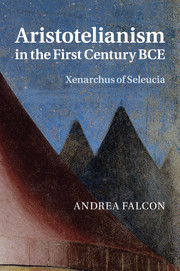Introduction
Published online by Cambridge University Press: 05 January 2012
Summary
Xenarchus of Seleucia is best known for his vigorous criticism of Aristotle's thesis that the celestial bodies are made of a special simple body, unique to them: the fifth substance, also known as the fifth body, fifth element, quinta essentia, or aither. However, his activity was not confined to the study of physics, let alone celestial physics. Although the surviving evidence is slim, and at times frustratingly so, there is no doubt that Xenarchus was concerned with issues of ethics and psychology as well as of physics. In this book I consider all areas of his activity in order to offer as complete a picture of Xenarchus as our sources permit.
For two reasons, particular emphasis is placed on Xenarchus’ criticism of Aristotle's doctrine of the fifth substance. The first reason is that the sophistication and ingenuity involved in this criticism presuppose a close textual study of Aristotle's works. This study led Xenarchus to a brilliant revision of the conceptual apparatus developed in Aristotle's writings on natural philosophy. Xenarchus elaborated a creative interpretation of Aristotle's theory of natural motion which made the celestial simple body expendable. There is conceptual discontinuity between this creative interpretation and what we know about the Hellenistic theories of motion. Xenarchus developed his theory of natural motion as a direct response to Aristotle's theory of motion. His critical engagement with Aristotle strongly suggests that his activity is best understood in the context of the return to Aristotle which took place in the first century bce. While some of his views are rooted in the philosophical debates of the late Hellenistic period, his activity as a whole presupposes the distance from Aristotle that confronted post-Hellenistic philosophers. In Xenarchus’ case, this distance prompted direct attention to Aristotle's text.
- Type
- Chapter
- Information
- Aristotelianism in the First Century BCEXenarchus of Seleucia, pp. 1 - 8Publisher: Cambridge University PressPrint publication year: 2011



